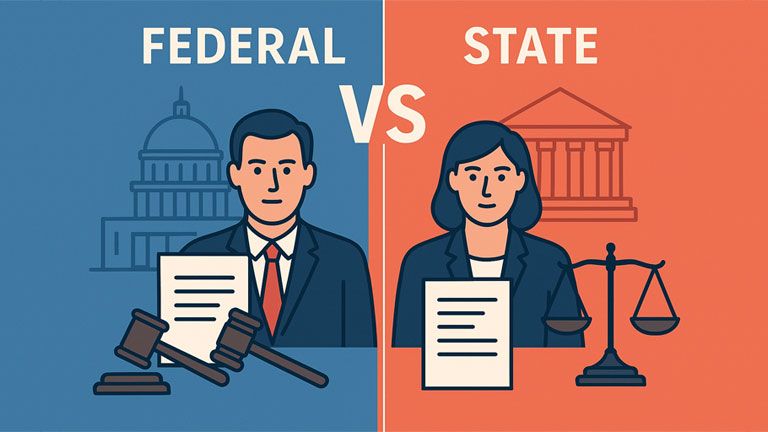
The U.S. Justice Department reported 309.6 federal prosecutions per 10 million people in January 2025, according to TRAC Reports. Prosecution rates for white-collar offenses reached a historic low of 24% of referred cases in the first half of 2025.
With charges filed in over 90% of cases, immigration matters continued to be prosecuted at a high rate. A criminal case may be handled either by a state or federal authority.
You need to be knowledgeable about federal and state charges so you can properly handle the next steps in legal proceedings.
Let’s take a look at the differences that lie between federal and state prosecutions.
Jurisdictional Differences: Federal vs. State
When setting apart one matter from another, you must understand jurisdiction as a key factor. Federal courts have matters involving federal laws and transnational types crossing state lines, like immigration or interstate commerce.
Meanwhile, state courts address cases violating state law, including petty theft or drug offenses. The same act will have several levels of prosecution depending upon its nature and impact.
Are federal crimes worse than state crimes? Federal crimes are arguably worse than state ones, as they involve larger investigations, cover much broader areas, and incur much more severe punishments.
Types of Crimes Prosecuted
Certain types of crimes handled by both court systems offer a vague indication of how jurisdiction may influence an individual’s legal treatment. Drug trafficking, immigration violations, and terrorism normally happen across state lines and are prosecuted under federal laws.
State prosecutions handle crimes like robbery, assault, and domestic violence. These distinctions can get confusing and handling them often feels overwhelming.
In-depth knowledge of the particulars surrounding your case will strengthen you and point you to the right assistance and resources. You can feel a sense of belonging once you begin to understand the legal nuances of both federal and state prosecution.
Legal Procedures and Processes
It is important to familiarize yourself with the many processes and procedures while dealing with the legal system to discern how they operate.
Federal cases have stricter regulations, including longer pretrial motions and discovery. Federal judges are more adept at controlling the proceedings, which sometimes facilitates a swifter resolution.
State prosecution cases differ widely and are primarily influenced by local laws and regulations. State courts encourage plea bargains to resolve these cases. Federal juries tend to have a larger and more diverse jury selection when compared to state cases.
Resources and Funding
Resources and funding form the basis for prosecution effectiveness at the federal and state levels. Federal prosecutors enjoy larger budgets and more resources to undertake complex investigations involving the testimony of expert witnesses, establishing higher chances for conviction.
At times, state prosecutors are limited by a scarcity of funds in probing an investigation or accomplishing the effective prosecution of the matter. This disparity can occasionally affect the justice system at large since some cases may not warrant much attention.
When communities unite in a campaign advocating for a greater share of funding, they help federal and state prosecutors exact justice in the best way for all parties involved.
Strategies and Approaches in Prosecution
Prosecutors use multiple strategies and techniques to effectively build their cases, selection depending much on the jurisdiction and type of crime involved. Federal prosecutions tend to stress long investigations, often calling upon resources from different agencies.
State prosecutors might place more importance on community support and victim advocacy as building blocks for their cases. Both are means toward earning credibility with the jury. The federal prosecutor would lay more stress on the law itself, while the state prosecutor’s arguments will center on human rights issues.
Familiarizing yourself with the differences in the strategies employed between a federal and state case helps you understand how justice is given to the affected party.
It may seem like all prosecutions work the same way, but in reality, federal and state cases can be very different. According to federal criminal defense lawyer Jessica J. Koester, federal charges could result from extensive investigations involving federal agents, wiretaps, or digital surveillance activities.


